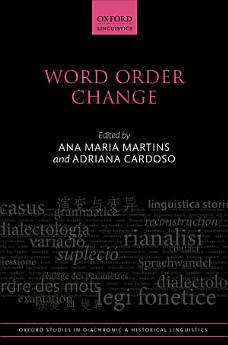Word Order Change
Ana Maria Martins · Adriana Cardoso
२०१८ जुन · Oxford Studies in Diachronic and Historical Linguistics पुस्तक 29 · Oxford University Press
इ-पुस्तक
336
पृष्ठहरू
family_home
योग्य
info
reportरेटिङ र रिभ्यूहरूको पुष्टि गरिएको हुँदैन थप जान्नुहोस्
यो इ-पुस्तकका बारेमा
This volume explores word order change within the framework of diachronic generative syntax. Word order is at the core of natural language grammatical systems, linking syntax with prosody and with semantics and pragmatics. The chapters in this volume use the tools provided by the generative theory of grammar to examine the constrained ways in which historical word order variants have given way to new ones over time. Following an introduction by the editors, the book is divided into four parts that investigate changes regarding the targets for movement within the clausal functional hierarchy; changes (or stability) in the nature of the triggers for movement; verb movement into the left peripheries; and types of movement, with specific focus on word order change in Latin. Data are drawn from a wide variety of languages from different families and from both classical and modern periods, including Sanskrit, Tocharian, Italian, Portuguese, Dutch, Irish, Hungarian, and Coptic Egyptian. The book's broad coverage and combination of language-internal and comparative studies offers new perspectives on the relation between word order change and syntactic movement. The volume also provides a range of wider insights into the properties of natural language and the way in which those properties constrain language variation and change.
लेखकको बारेमा
Ana Maria Martins is Professor at the School of Arts and Humanities at the University of Lisbon. Her research in comparative syntax and historical syntax covers topics such as word order, clitics, negation, emphatic polarity, infinitival structures, and passive and impersonal constructions. She has directed projects resulting in parsed corpora for the study of the syntax of European Portuguese dialects (CORDIAL-SIN) and the syntax of Old Portuguese (WOChWEL). She has published articles in journals such as Lingua, Natural Language and Linguistic Theory, and Linguistic Inquiry, and is the editor of Manual de Linguística Portuguesa (De Gruyter, 2016) and co-editor of the journal Estudos de Lingüística Galega. Adriana Cardoso is Assistant Professor at the Higher Education College of Lisbon (ESELx) and researcher at the Linguistics Centre of the University of Lisbon (CLUL). Her main research interests are historical linguistics, comparative syntax, and educational linguistics. She was recently involved in the WOChWEL project (Word Order and Word Order Change in Western European Languages), sponsored by the Portuguese National Science Agency. Her book Portuguese Relative Clauses in Synchrony and Diachrony was published in 2017 by OUP.
यो इ-पुस्तकको मूल्याङ्कन गर्नुहोस्
हामीलाई आफ्नो धारणा बताउनुहोस्।
जानकारी पढ्दै
स्मार्टफोन तथा ट्याबलेटहरू
Android र iPad/iPhone का लागि Google Play किताब एप को इन्स्टल गर्नुहोस्। यो तपाईंको खातासॅंग स्वतः सिंक हुन्छ र तपाईं अनलाइन वा अफलाइन जहाँ भए पनि अध्ययन गर्न दिन्छ।
ल्यापटप तथा कम्प्युटरहरू
तपाईं Google Play मा खरिद गरिएको अडियोबुक आफ्नो कम्प्युटरको वेब ब्राउजर प्रयोग गरेर सुन्न सक्नुहुन्छ।
eReaders र अन्य उपकरणहरू
Kobo eReaders जस्ता e-ink डिभाइसहरूमा फाइल पढ्न तपाईंले फाइल डाउनलोड गरेर उक्त फाइल आफ्नो डिभाइसमा ट्रान्स्फर गर्नु पर्ने हुन्छ। ती फाइलहरू पढ्न मिल्ने इबुक रिडरहरूमा ती फाइलहरू ट्रान्स्फर गर्नेसम्बन्धी विस्तृत निर्देशनहरू प्राप्त गर्न मद्दत केन्द्र मा जानुहोस्।









